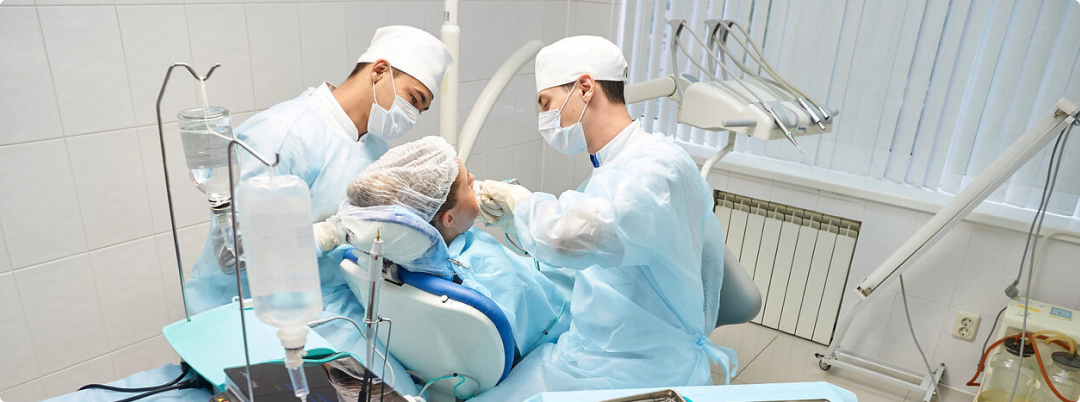Implantation is a modern way of restoring a lost tooth. Implant placement is a surgery, so like any surgical intervention, it has contraindications. Let’s talk about them in more detail.
Indications for implantation
A titanium implant is an artificial root that is securely fixed in the bone tissue.
In one-stage implantation, a crown is placed on it immediately, while in delayed implantation this happens after 4-6 months. From that moment, all the functions of the previously lost tooth are restored, and the patient returns to the usual way of life.
Implantation is the most comfortable method of restoring teeth, including their complete loss (adentia). Dentures on implants last a long time and look natural.
Contraindications to dental implantation
Classical dental implantation is carried out in two stages and involves the violation of the integrity of bone tissues of the body, so there are contraindications for its implementation.
They can be divided into two groups:
- absolute – diseases in the presence of which implantation is impossible in principle
- relative – these are temporary conditions of the patient, in which the operation cannot be performed, and diseases that require special control on the part of the doctor.
Every year the list of contraindications for implantation becomes shorter and shorter.

Absolute contraindications to implantation
Specialists distinguish a list of diseases in the presence of which the installation of implants is impossible.
Conditionally, this list can be divided into three groups:
- Autoimmune diseases: lupus erythematosus, rheumatoid arthritis and multiple sclerosis
- Tissue regeneration disorders: AIDS, post-chemotherapy conditions, certain hormonal diseases and organ transplants, connective tissue diseases
- Severe disorders of the cardiovascular, nervous (both central and peripheral), endocrine (decompensated diabetes mellitus, chronic liver or kidney failure) and circulatory systems, including poor coagulation.
In addition, a contraindication to implantation is chronic alcoholism and drug addiction, allergic reaction to anesthesia, without which it is impossible to carry out dental implantation, as well as taking drugs that increase the risk of rejection of the implant.
If there are absolute contraindications, dental implantation cannot be performed.
In this case, the doctor will definitely offer you other ways of restoring the teeth.
Relative contraindications to implantation
Temporary contraindications allow dental implantation, but only if a number of certain conditions are met.
Relative contraindications include:
- insufficient bone volume
- bite disorders
- inflammatory processes in the oral cavity
- tooth decay
- compensated diabetes mellitus
- periodontal diseases
- poor oral hygiene
- tartar
- pregnancy and breastfeeding
- smoking
Most of these contraindications can be corrected. For example, bone augmentation, correcting the bite with braces, removing hard deposits with professional oral hygiene. And in the presence of a number of diseases, such as compensated diabetes mellitus, requires increased monitoring by the implantologist.
Hepatitis in remission is not a contraindication to implantation. However, surgery should not be performed in the acute phase of the disease.
Age as a contraindication to implantation
Age is also one of the contraindications to dental implants. Such an operation can be performed only after the dentoalveolar system and bone tissue are fully formed. This usually happens by the age of 18-21. There is no clear upper age threshold for implantation: it all depends on the patient’s general condition.

Possible complications after implantation
Complications after dental implantation are now very rare, because the technology of this operation is well developed. Nevertheless, unpleasant consequences are possible. As a rule, they appear in the first months after the surgical intervention, but sometimes even 2-3 years later.
In this case, it is considered normal if after implantation the patient is observed:
- painful sensations in the first 2-3 days
- swelling, which should completely disappear after five to seven days
- slght bleeding in the first few days
- an increase in body temperature up to 37 ° C for three days
- a feeling of numbness, which should go away after five hours.
In other situations, it is necessary to urgently seek help from a doctor to exclude the possibility of complications. The most serious of them are peri-implantitis and implant rejection.




